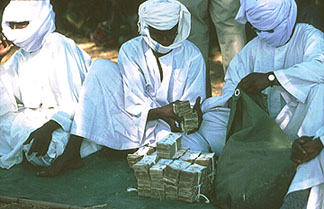 Among the many accusations against Church, crusades, inquisition and slavery might come in the list of top five (colonialism and women oppression being the other two). While we repent for these as we failed by the biblical standards, we need to remember at least three things; (a) none of these crimes were uniquely Christian rather they were/are common to humanity (b) The intensity of these crimes were not as grave as it popularly projected (c) Christians are unique in repenting for these crimes. The following articles are compiled to present these views. While we may not certainly agree with everything said in these articles, these articles are published by the Sakshi Research Team to initiate an open and genuine discussion on these subjects.
Among the many accusations against Church, crusades, inquisition and slavery might come in the list of top five (colonialism and women oppression being the other two). While we repent for these as we failed by the biblical standards, we need to remember at least three things; (a) none of these crimes were uniquely Christian rather they were/are common to humanity (b) The intensity of these crimes were not as grave as it popularly projected (c) Christians are unique in repenting for these crimes. The following articles are compiled to present these views. While we may not certainly agree with everything said in these articles, these articles are published by the Sakshi Research Team to initiate an open and genuine discussion on these subjects.
Crusades: The unconventional views on crusades are presented by Robert Spencer, a scholar and a popular author on Islam. He writes:
“The circumstances of the first Crusade were these: Christian pilgrims to the Holy Land were being molested by Muslims and prevented from reaching the holy places. Some were killed. This was finally the impetus that moved Western Christianity to try to take back just one small portion of the Christian lands that had fallen to the Muslim sword over the last centuries. “The Crusade,” noted historian Bernard Lewis, “was a delayed response to the jihad, the holy war for Islam, and its purpose was to recover by war what had been lost by war — to free the holy places of Christendom and open them once again, without impediment, to Christian pilgrimage.”
Whatever undeniable sins Christians committed during their course, the Crusades were essentially a defensive action: a belated and insufficient attempt by Western Christians to turn back the tide of Islam that had engulfed the Eastern Church. “When accusing the West of imperialism,” says the historian of jihad Paul Fregosi, “Muslims are obsessed with the Christian Crusades but have forgotten their own, much grander Jihad.”
The lands in dispute during each Crusade were the ancient lands of Christendom, where Christians had flourished for centuries before Muhammad’s armies called them idolaters and enslaved and killed them. If Westerners had no right to invade these putative Muslim lands, then Muslims had no right to take them in the first place.” Read the entire article here.
Inquisition: An interesting article on inquisition is presented by Thomas F. Madden, professor and chair of the department of history at Saint Louis University in St. Louis, Missouri. He writes:
The Inquisition was not born out of desire to crush diversity or oppress people; it was rather an attempt to stop unjust executions. Yes, you read that correctly. Heresy was a crime against the state. Roman law in the Code of Justinian made it a capital offense. Rulers, whose authority was believed to come from God, had no patience for heretics. Neither did common people, who saw them as dangerous outsiders who would bring down divine wrath. When someone was accused of heresy in the early Middle Ages, they were brought to the local lord for judgment, just as if they had stolen a pig or damaged shrubbery (really, it was a serious crime in England).
Yet in contrast to those crimes, it was not so easy to discern whether the accused was really a heretic. For starters, one needed some basic theological training—something most medieval lords sorely lacked. The result is that uncounted thousands across Europe were executed by secular authorities without fair trials or a competent assessment of the validity of the charge. The Catholic Church's response to this problem was the Inquisition, first instituted by Pope Lucius III in 1184. It was born out of a need to provide fair trials for accused heretics using laws of evidence and presided over by knowledgeable judges. From the perspective of secular authorities, heretics were traitors to God and the king and therefore deserved death.
From the perspective of the Church, however, heretics were lost sheep who had strayed from the flock. As shepherds, the pope and bishops had a duty to bring them back into the fold, just as the Good Shepherd had commanded them. So, while medieval secular leaders were trying to safeguard their kingdoms, the Church was trying to save souls. The Inquisition provided a means for heretics to escape death and return to the community. You can read the entire article here.
Slavery: Different perspectives on slavery are presented by Thomas Sowell, one of the greatest economists of modern times and popular Afro American columnist.
Thomas Sowell has pointed out that while Whites exported 11 million Africans as slaves, Arabs exported 13 million African
s as slaves. Thomas Sowell also writes:
“To me the most staggering thing about the long history of slavery — which encompassed the entire world and every race in it — is that nowhere before the 18th century was there any serious question raised about whether slavery was right or wrong. In the late 18th century, that question arose in Western civilization, but nowhere else.”
Also, “Nothing could be more jolting and discordant with the vision of today's intellectuals than the fact that it was businessmen, devout religious leaders and Western imperialists who together destroyed slavery around the world. And if it doesn't fit their vision, it is the same to them as if it never happened. As anti-slavery ideas eventually spread throughout Western civilization, a worldwide struggle pitted the West against Africans, Arabs, Asians and virtually the entire non-Western world, which still saw nothing wrong with slavery. But Western imperialists had gunpowder weapons first and that enabled the West to stamp out slavery in other societies as well as in its own.”
You can read two of his articles here and here.
{moscomment}




